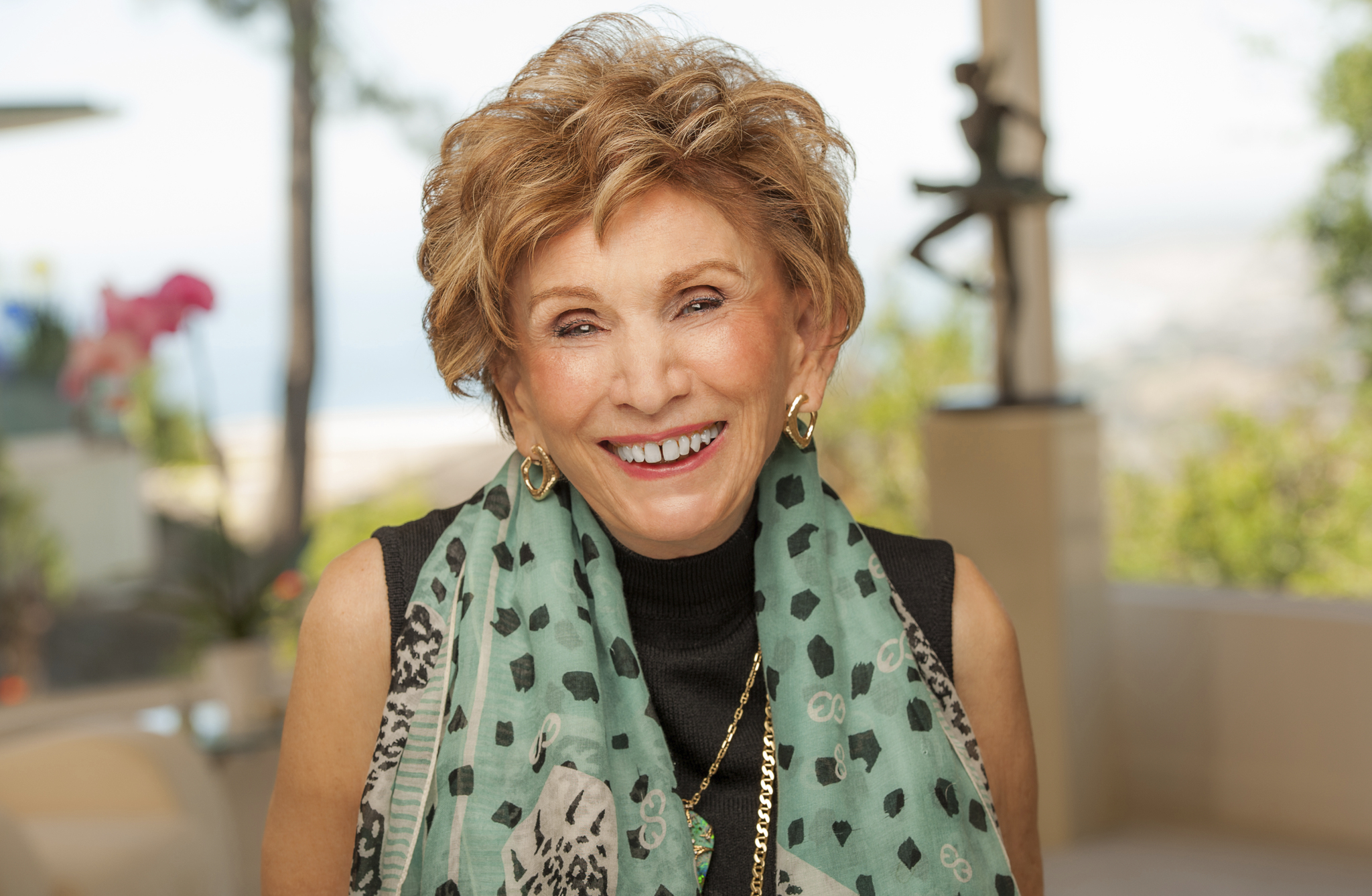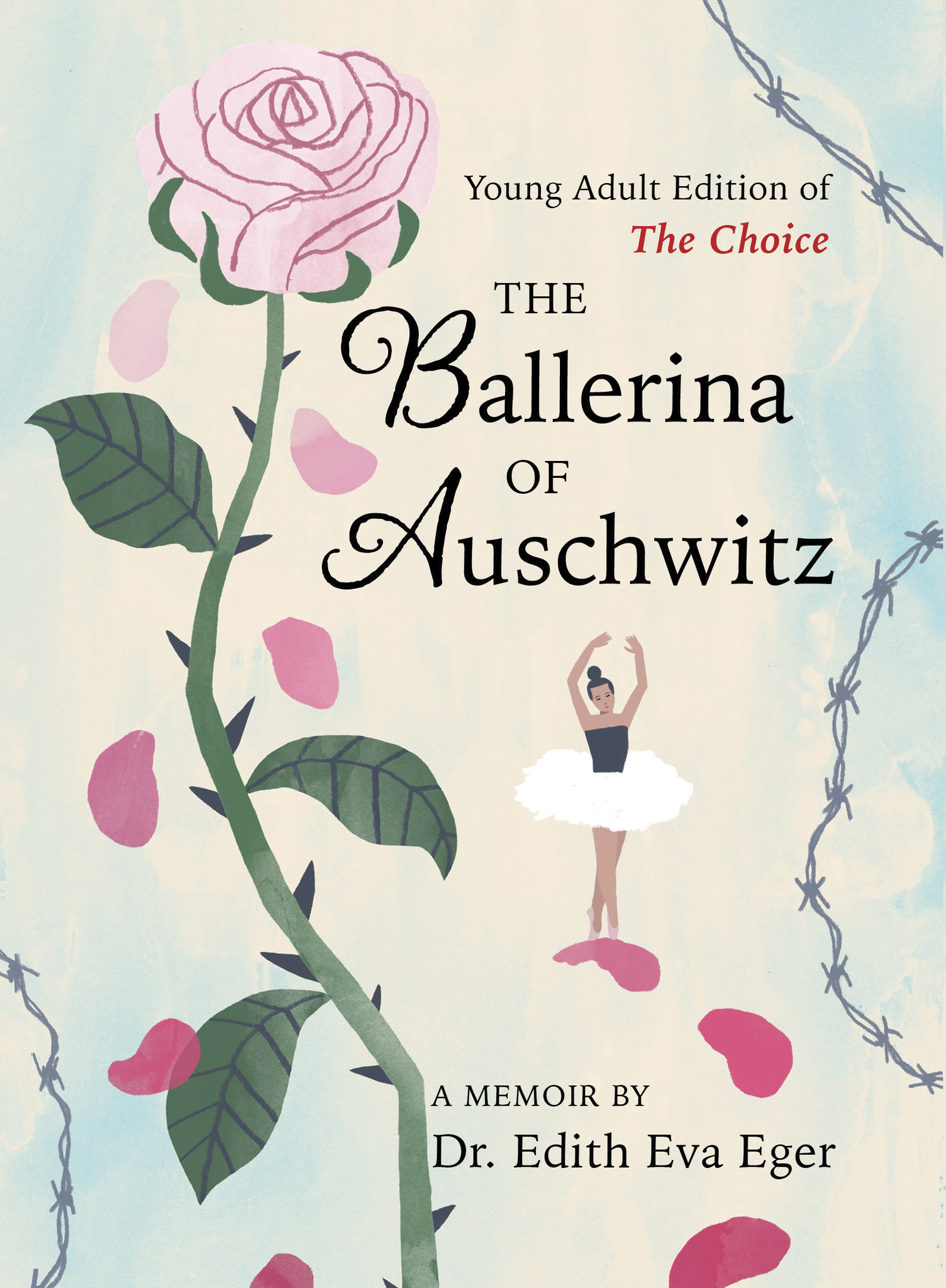I am pleased to present my interview with Dr. Edith Eva Eger to discuss THE BALLERINA OF AUSCHWITZ (Atheneum Books for Young Readers, 2024), a YA edition of her award-winning memoir THE CHOICE: EMBRACE THE POSSIBLE. In the book, Dr. Eger shares her family history and her experiences during the Holocaust as a teen and young adult.
Dr. Eger is a well-known psychologist, speaker, and author. In her career, she has focused on helping people deal with trauma and has been praised worldwide for her contributions. I have long admired Dr. Eger’s important work, and I’m so pleased she has written a memoir specifically for younger readers. I’m honored to share her meaningful insights.
Welcome, Dr. Eger.
You have shared your personal history in books for adults. Why did you decide to write your memoir specifically for young adults?
When I’m working with my precious patients, one of the most useful questions I love to ask is: “When did your childhood end?”
The end of childhood is completely natural—and necessary, exciting, and challenging. We all pass through this beautiful and tumultuous threshold on the way to adulthood.
Yet some of us experience a premature end to childhood. Perhaps there is instability in our families or communities. Maybe we end up caring for an ill or addicted family member. Maybe there is violence in our homes or societies. All kinds of pressures and circumstances can force us into survival mode, or freight us with roles or responsibilities that don’t fit our chronological age or stage of development. We have to grow up too fast.
This is what happened to me. I was just entering the natural (and difficult!) period of adolescence—figuring out who I was within my family and apart from my parents and sisters; falling in love for the first time; identifying and pursuing passions; seeking out intellectual and athletic challenges—when life as I knew it was interrupted by war. I love connecting with middle and high school audiences because young adulthood was such a transformative time in my life, and because I want to offer young people the support, perspective, and hope I was so hungry to receive when I was that age. Ever since I began telling my story in service of others’ healing and thriving it’s been my ambition to write a book for young adults, to be a cheerleader encouraging young people to create and enjoy a life that is whole, authentic, and free.

Photo: Jordan Engle
In the book, you describe your teen self in such a relatable way – you have dreams and plans and insecurities, too. Yet, through your harrowing experiences in Auschwitz, you seemed to summon so much strength. What do you hope young readers take away from your story?
Without minimizing the absolute horror and cruelty of imprisonment, starvation, torture, and violence, I can also say that in the death camps, I learned how to live.
The most important thing I learned is that when nothing good is coming from the outside we have to turn inward for meaning, for motivation, for inner resources. It’s what my mother told me in the cattle car, before we knew there was such a place as Auschwitz: “No one can take away from you what you’ve put in your mind.”
When there was nothing but watery soup and stale bread to eat, I learned to feast in my mind. When I was lonely and scared, I thought of my boyfriend, Eric—I heard his voice in my head, I remembered the feeling of his arms around me, I fantasized about our reunion one day. My rich inner world created a sanctuary that helped me survive.
Cultivating inner resources was vital after liberation, as well. Not dying is not the same as choosing to be alive. In grieving and coming to terms with what happened, and in fully embracing life, I was finally able to harness my inner freedom.
Even in the direst of circumstances, we have a choice. We can’t eradicate the dark, but we can kindle the light.
Your relationship with your sister, Magda, is so moving. Your love and connection to each other sustained you both. Do you think your sibling relationship shaped your views on hope and courage?
It’s funny: Magda always said she had to stay alive in Auschwitz because if she died, who would look after me? And I’ve always said I had to survive so I could keep my sister alive. Who was saving who?
Auschwitz turned out to be a very potent reminder of our interdependence. Cooperation was the name of the game. We can tend to have such an individualist vision of what constitutes a successful life or healthy psyche. But if we live in such a way that we deny our interconnectedness, we’re missing the point. Life is most meaningful when we share it, when we give ourselves to others and to something larger than ourselves. At the same time, we have to acknowledge and tolerate our differences. After the war, I knew I had to return to Auschwitz to process my trauma; Magda knew she could never return. I desperately wanted Magda to go back with me, for us to confront the past together. It was painful when I couldn’t convince her to go. But I had to accept that Magda was right for Magda, and Edie was right for Edie. Our love was sturdy and supple enough for us to want and need different things. We could love and support each other without needing to change each other.
Your love of dance has impacted your life in many ways. How important are the arts to our happiness?
I titled this book The Ballerina of Auschwitz to highlight the opportunity I’ve had—and the choice I’ve made—to dance through life’s joys and struggles. My ballet teacher used to tell me, “All your ecstasy in life will come from the inside.” I didn’t really understand what he meant until I was in Auschwitz, and I realized that even in horrific circumstances I could access my inner dancer.
Any creative act opens the door both to an authentic inner landscape and to a larger realm—a place where life force and spiritual energy abound, where we can rely on our being, not our doing.
Creativity is also important because, as I often say, expression is the opposite of depression. When we express ourselves creatively we feel more alive and more attuned with our inherent worth. And we release emotions so they don’t get stuck. Besides, dancing is so much fun. What a gift to lean into the music, to feel my body, to move and exalt.

This has been a difficult year in the Jewish community. How do we foster hope and courage in today’s young people?
I recently received a note from an Israeli combat soldier assigned to fight in Gaza. I was moved by his letter and by the pain and fear he confronts every day. His letter also made me wonder more broadly about what a 97-year-old Hungarian-American Holocaust survivor can say to the young people risking their lives in this conflict–or to anyone of any nationality, ethnicity, race, or faith who is feeling the pain, loss, uncertainty, fear, and fatigue of this brutal war. How can I comfort this soldier, survivor to survivor? Can I pass on my strength instead of my loss?
I’ve thought a lot this year about forgiveness—about how to forgive the unforgivable.
People often ask how I can ever forgive the Nazis. Yet forgiveness isn’t something we do for the person who’s hurt us. It’s something we do for ourselves, so we’re no longer prisoners of the past or victims of any circumstance, so we can stop carrying a burden that harbors nothing but pain.
And this is also true: There’s no forgiveness without rage. I had to learn not to suppress my anger, but channel and release it so that I could get to the more vulnerable feelings underneath it—the grief and the fear, the soft underbelly the anger was there to protect.
Ultimately, to forgive is to grieve–for what happened, for what didn’t happen–and to give up the need for a different past. To accept life as it was and as it is. Of course it wasn’t acceptable for Hitler to murder six million people. But it happened, and I don’t want that fact to destroy the life that I clung to and fought for against all odds.
I don’t have the godly power to anoint anyone with forgiveness, to spiritually cleanse others for their wrongs. But I have the power to free myself.
To the precious soldier who wrote to me, to all those struggling in Israel and Gaza, to any person trapped in a mental prison of victimhood or blame: may you also be free.
Thank you, Dr. Eger, for all you do and for being an inspiration and a light for so many.
Edith Eger is an eminent psychologist and one of the few remaining Holocaust survivors old enough to remember life in the camps. A colleague of Viktor Frankl, Dr. Edith Eger has worked with veterans, military personnel, and victims of physical and mental trauma. She lives in La Jolla, California, and is the author of the bestselling and award-winning books The Choice and The Gift.
I loved The Choice! I can’t wait to read this new book!
It’s so moving – I know you will think so, too!